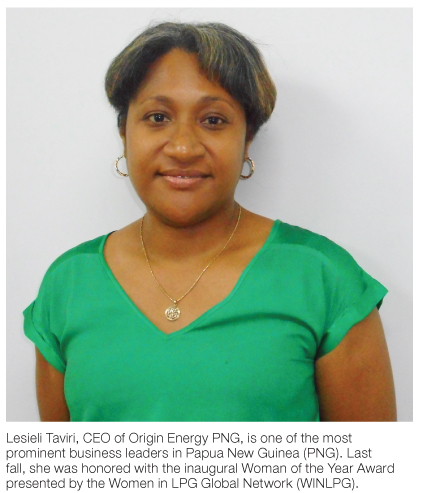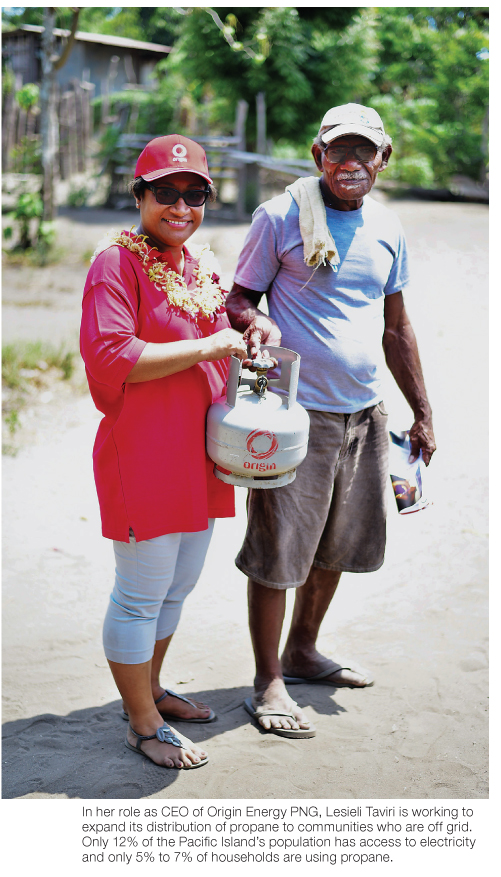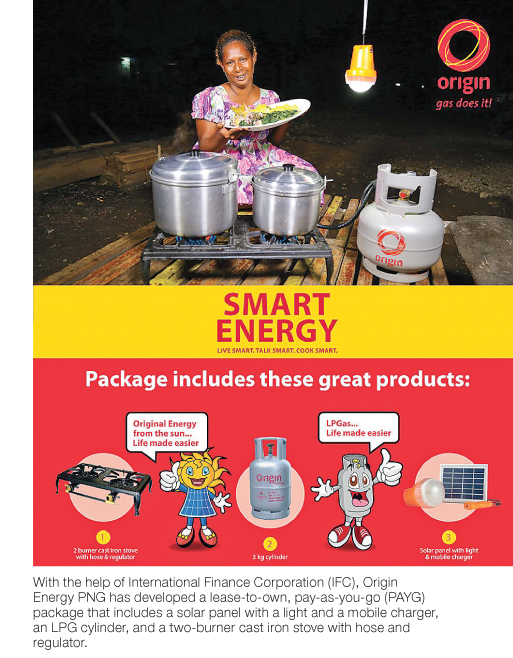Tuesday, May 28, 2019
Early in her career, Lesieli Taviri walked into a meeting of business leaders and froze. She saw that she was the only woman in the room, she didn’t recognize anybody, and, for the first time in her life, she felt intimidated. She walked to the back of the room, sat alone for the duration of the meeting, and then left without having said anything to anyone.
 “I knew I had to make a choice of just avoiding such gatherings—which was an easy choice, but would not be beneficial from a business point—or make a courageous decision to try and belong,” Taviri told BPN recently. “So I chose the latter and knew I needed to find a different strategy to help build my confidence. I joined a networking club of professionals and committed to every event, volunteered with everything that came my way—from coordinating events and seeking sponsorship to public speaking—and eventually became the first female president.”
“I knew I had to make a choice of just avoiding such gatherings—which was an easy choice, but would not be beneficial from a business point—or make a courageous decision to try and belong,” Taviri told BPN recently. “So I chose the latter and knew I needed to find a different strategy to help build my confidence. I joined a networking club of professionals and committed to every event, volunteered with everything that came my way—from coordinating events and seeking sponsorship to public speaking—and eventually became the first female president.”
Building A Network
Today, Taviri is one of the most prominent business leaders in Papua New Guinea (PNG). She is CEO of Origin Energy PNG, one of the largest providers of propane in the Pacific region. She is a member of the board of directors of MiBank, a bank with 12 branches and many agents across PNG, and Nambawan Super Ltd., the trustee of a contributory pension fund that provides an income for PNG citizens who retire or become permanently disabled. She is also chair of the Business Coalition for Women (BCFW), a group of companies working to improve the equal economic contribution of women in the private sector in PNG.
“It was through the dealings of the club that I started to expose myself to other industries and influential people and built my network of advisors,” she said. “Today, I still attend such meetings but it’s now a different experience and as every woman walks through the door, I always remember that experience and I get a lift simply knowing that a simple act of courage can make it easier for other women to believe they belong.”
In recognition of her accomplishments and her efforts to help others, Taviri was honored last fall with the inaugural Woman of the Year Award presented by the Women in LPG Global Network (WINLPG), an initiative of the World LPG Association (WLPGA). The presenters explained that this award honors women who show a commitment to business beyond profit, show innovative thinking to achieving career goals, create a positive impact on their business by promoting diversity, and show innovation in company turnaround.
Extending Distribution of Energy
In her role as CEO of Origin Energy PNG, Taviri is working to expand its distribution of propane to communities who are off grid. Distributing energy in PNG is a challenge. The Pacific Island nation is about the size of California and has a population of only about 7 million. The terrain is mostly mountainous.
Only 12% of the population has access to electricity, Taviri said, “so the vast majority of PNG is still in darkness with people using kerosene lamps, torches, batteries, candles, and even open fire.”
 “LPG reach is only about 5% to 7% of households, predominantly in the urban to semi populated district towns,” she added. “The challenge is 80% of the population still live in rural areas where there is lack of reliable transportation infrastructure, which results in high cost of distribution. The density per kilometer is only 18 people per square kilometer [46 people per square mile] and people are spread out across the entire country in little pockets as cultural families move around to protect land (majority of land is traditionally owned). That in itself provides challenges with economies of scale.”
“LPG reach is only about 5% to 7% of households, predominantly in the urban to semi populated district towns,” she added. “The challenge is 80% of the population still live in rural areas where there is lack of reliable transportation infrastructure, which results in high cost of distribution. The density per kilometer is only 18 people per square kilometer [46 people per square mile] and people are spread out across the entire country in little pockets as cultural families move around to protect land (majority of land is traditionally owned). That in itself provides challenges with economies of scale.”
“However, with improved infrastructure and services coming closer to these communities, we expect more accessibility to LPG using scalable models.”
With the help of International Finance Corporation (IFC), Origin Energy PNG has developed a lease-to-own, pay-as-you-go (PAYG) system to extend the distribution of solar and propane. Currently in the pilot phase, the system uses a mobile payment platform provided by a bank and using the bank agent network. The PAYG package includes a solar panel with a light and a mobile charger, an LPG cylinder, and a two-burner cast iron stove with hose and regulator.
“Customers are provided a range of products depending on repayment affordability,” Taviri explained. “The repayment is over 12 months and the solar is unlocked and ownership is transferred once the kit has been paid for. The product helps to migrate the unbanked to bank as PNG is predominantly a cash economy and promotes the use of mobile banking. The benefit to the medium business is multiple streams of revenue from the repeat gas sales, a margin on the PAYG package, and a cut in the bank transaction fee where cash is exchanged for e-payment by the agent.”
Advancing Participation of Women
As chair of BCFW, Taviri is helping the organization provide tools and services for businesses to help them provide a more conducive working environment for women. These tools focus on four key areas that businesses in PNG feel are challenges to advancing the participation of women.
To support companies in addressing family and sexual violence (FSV), BCFW provides a suite of model policies, research, and awareness and training programs. “We provide training programs for businesses to help staff understand the economic and social impacts of FSV and work with other stakeholders to develop a support system to help victims of FSV,” Taviri said.
To promote women in leadership, BCFW provides a program that is aimed at preparing women for leadership roles. “We have also launched a mentoring and coaching program to help support women graduates,” she added.
 To increase and retain female participation in the workforce, BCFW has created a suite of model policies and worked with businesses in the extractive sector to conduct audits and develop gender smart safety policies and practices. And, to expand opportunities for women-owned businesses in supply chains, BCFW aims to encourage businesses through policy to allow participation of women-owned businesses in their supply chain, either as resellers, customers, or suppliers.
To increase and retain female participation in the workforce, BCFW has created a suite of model policies and worked with businesses in the extractive sector to conduct audits and develop gender smart safety policies and practices. And, to expand opportunities for women-owned businesses in supply chains, BCFW aims to encourage businesses through policy to allow participation of women-owned businesses in their supply chain, either as resellers, customers, or suppliers.
Asked about the greatest improvements she has seen businesses make during her time with BCFW, Taviri answered, “Simply the response of businesses—more CEOs have become attuned to the business case of why equal participation of women can improve a business’s bottom line.”
She pointed to the findings of a monitoring and evaluation (M&E) report released by IFC in 2017, three years after the establishment of BCFW. It said BCFW had impacted more than 50,000 employees across 47 businesses with at least one substantive change to policies, practices, or standards. Over the same period, BCFW hosted more than 70 workshops, training events, seminars, and conferences, with more than 950 participants.
Guiding Principles
Asked for advice she would share with women who aspire to become senior executives, as she has done since attending that difficult meeting of business leaders early in her career, Taviri said: “Be comfortable in your skin, play to your strengths, and develop a circle of advisors (internally and externally) who are able to complement your weaknesses. Always have a compass to give direction and a set of guiding principles to help you make decisions every day—from the kitchen to the boardroom table. Balance visionary with pragmatism and be courageous.” — STEVE RELYEA
(SOURCE: Butane-Propane News, May 2019)
 “I knew I had to make a choice of just avoiding such gatherings—which was an easy choice, but would not be beneficial from a business point—or make a courageous decision to try and belong,” Taviri told BPN recently. “So I chose the latter and knew I needed to find a different strategy to help build my confidence. I joined a networking club of professionals and committed to every event, volunteered with everything that came my way—from coordinating events and seeking sponsorship to public speaking—and eventually became the first female president.”
“I knew I had to make a choice of just avoiding such gatherings—which was an easy choice, but would not be beneficial from a business point—or make a courageous decision to try and belong,” Taviri told BPN recently. “So I chose the latter and knew I needed to find a different strategy to help build my confidence. I joined a networking club of professionals and committed to every event, volunteered with everything that came my way—from coordinating events and seeking sponsorship to public speaking—and eventually became the first female president.”Building A Network
Today, Taviri is one of the most prominent business leaders in Papua New Guinea (PNG). She is CEO of Origin Energy PNG, one of the largest providers of propane in the Pacific region. She is a member of the board of directors of MiBank, a bank with 12 branches and many agents across PNG, and Nambawan Super Ltd., the trustee of a contributory pension fund that provides an income for PNG citizens who retire or become permanently disabled. She is also chair of the Business Coalition for Women (BCFW), a group of companies working to improve the equal economic contribution of women in the private sector in PNG.
“It was through the dealings of the club that I started to expose myself to other industries and influential people and built my network of advisors,” she said. “Today, I still attend such meetings but it’s now a different experience and as every woman walks through the door, I always remember that experience and I get a lift simply knowing that a simple act of courage can make it easier for other women to believe they belong.”
In recognition of her accomplishments and her efforts to help others, Taviri was honored last fall with the inaugural Woman of the Year Award presented by the Women in LPG Global Network (WINLPG), an initiative of the World LPG Association (WLPGA). The presenters explained that this award honors women who show a commitment to business beyond profit, show innovative thinking to achieving career goals, create a positive impact on their business by promoting diversity, and show innovation in company turnaround.
Extending Distribution of Energy
In her role as CEO of Origin Energy PNG, Taviri is working to expand its distribution of propane to communities who are off grid. Distributing energy in PNG is a challenge. The Pacific Island nation is about the size of California and has a population of only about 7 million. The terrain is mostly mountainous.
Only 12% of the population has access to electricity, Taviri said, “so the vast majority of PNG is still in darkness with people using kerosene lamps, torches, batteries, candles, and even open fire.”
 “LPG reach is only about 5% to 7% of households, predominantly in the urban to semi populated district towns,” she added. “The challenge is 80% of the population still live in rural areas where there is lack of reliable transportation infrastructure, which results in high cost of distribution. The density per kilometer is only 18 people per square kilometer [46 people per square mile] and people are spread out across the entire country in little pockets as cultural families move around to protect land (majority of land is traditionally owned). That in itself provides challenges with economies of scale.”
“LPG reach is only about 5% to 7% of households, predominantly in the urban to semi populated district towns,” she added. “The challenge is 80% of the population still live in rural areas where there is lack of reliable transportation infrastructure, which results in high cost of distribution. The density per kilometer is only 18 people per square kilometer [46 people per square mile] and people are spread out across the entire country in little pockets as cultural families move around to protect land (majority of land is traditionally owned). That in itself provides challenges with economies of scale.”“However, with improved infrastructure and services coming closer to these communities, we expect more accessibility to LPG using scalable models.”
With the help of International Finance Corporation (IFC), Origin Energy PNG has developed a lease-to-own, pay-as-you-go (PAYG) system to extend the distribution of solar and propane. Currently in the pilot phase, the system uses a mobile payment platform provided by a bank and using the bank agent network. The PAYG package includes a solar panel with a light and a mobile charger, an LPG cylinder, and a two-burner cast iron stove with hose and regulator.
“Customers are provided a range of products depending on repayment affordability,” Taviri explained. “The repayment is over 12 months and the solar is unlocked and ownership is transferred once the kit has been paid for. The product helps to migrate the unbanked to bank as PNG is predominantly a cash economy and promotes the use of mobile banking. The benefit to the medium business is multiple streams of revenue from the repeat gas sales, a margin on the PAYG package, and a cut in the bank transaction fee where cash is exchanged for e-payment by the agent.”
Advancing Participation of Women
As chair of BCFW, Taviri is helping the organization provide tools and services for businesses to help them provide a more conducive working environment for women. These tools focus on four key areas that businesses in PNG feel are challenges to advancing the participation of women.
To support companies in addressing family and sexual violence (FSV), BCFW provides a suite of model policies, research, and awareness and training programs. “We provide training programs for businesses to help staff understand the economic and social impacts of FSV and work with other stakeholders to develop a support system to help victims of FSV,” Taviri said.
To promote women in leadership, BCFW provides a program that is aimed at preparing women for leadership roles. “We have also launched a mentoring and coaching program to help support women graduates,” she added.
 To increase and retain female participation in the workforce, BCFW has created a suite of model policies and worked with businesses in the extractive sector to conduct audits and develop gender smart safety policies and practices. And, to expand opportunities for women-owned businesses in supply chains, BCFW aims to encourage businesses through policy to allow participation of women-owned businesses in their supply chain, either as resellers, customers, or suppliers.
To increase and retain female participation in the workforce, BCFW has created a suite of model policies and worked with businesses in the extractive sector to conduct audits and develop gender smart safety policies and practices. And, to expand opportunities for women-owned businesses in supply chains, BCFW aims to encourage businesses through policy to allow participation of women-owned businesses in their supply chain, either as resellers, customers, or suppliers.Asked about the greatest improvements she has seen businesses make during her time with BCFW, Taviri answered, “Simply the response of businesses—more CEOs have become attuned to the business case of why equal participation of women can improve a business’s bottom line.”
She pointed to the findings of a monitoring and evaluation (M&E) report released by IFC in 2017, three years after the establishment of BCFW. It said BCFW had impacted more than 50,000 employees across 47 businesses with at least one substantive change to policies, practices, or standards. Over the same period, BCFW hosted more than 70 workshops, training events, seminars, and conferences, with more than 950 participants.
Guiding Principles
Asked for advice she would share with women who aspire to become senior executives, as she has done since attending that difficult meeting of business leaders early in her career, Taviri said: “Be comfortable in your skin, play to your strengths, and develop a circle of advisors (internally and externally) who are able to complement your weaknesses. Always have a compass to give direction and a set of guiding principles to help you make decisions every day—from the kitchen to the boardroom table. Balance visionary with pragmatism and be courageous.” — STEVE RELYEA
(SOURCE: Butane-Propane News, May 2019)

